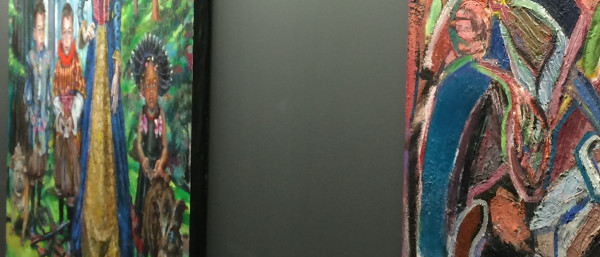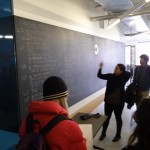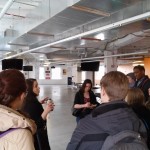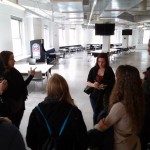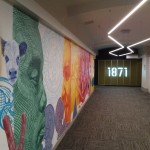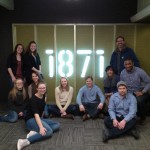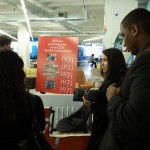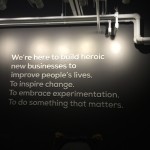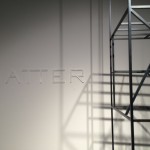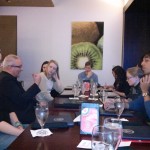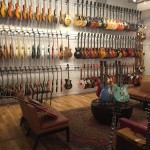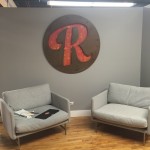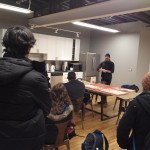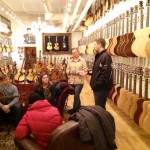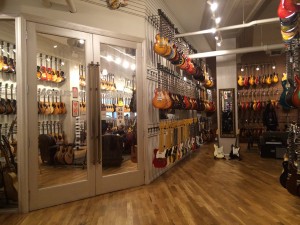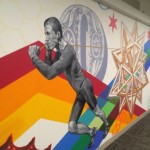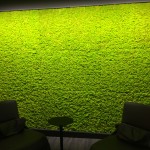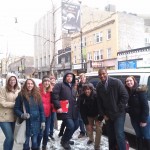Our first stop was 1871, where Diana Lopez-Obaldo gave us a tour of the facility and told us what they offer. To it’s members, 1871 offers co-working space and access to hundreds of classes, lectures, and seminars. There are different types of memberships and prices depending on what level each business is at. There is about 350 startups in 1871 and about 600 employees within them.
There are 9 total accelerators in 1871; Impact Engine and Techstars were the first ones.
I really loved the art that was displayed all over the walls in 1871. The CEO of 1871, Howard Tullman, is the collector of all of the art, which was very interesting.
Next, we went down the hall to MATTER, where Mindi Knebel showed us that facility. Matter literally officially launched about a week ago. They are very passionate about creating products and services that advance the healthcare industry. Within matter, the members offer mentors, networking and shared resources. They are all about creating “unnatural collisions” where they are forcefully bringing people together.
So, far there are 60 companies in Matter, and they just started recruiting in August.
I loved the simulation room for an operating room and the interactions studio to improve patient and physician interactions.
I liked how 1871 and MATTER were located right next to each other and that they use each other.
- Mission of MATTER
For lunch we went to Nick’s Fish Market with Paul Magelli Jr (PJ). He gave us all wonderful advice on being an entrepreneur and thinking strategically and logically within our lives as aspiring entrepreneurs. PJ also gave us a lot of background knowledge of what makes these accelerators important and successful.
For example, he told us that we will receive advice on our business from everyone, but WE will have to know the true value of the business. We must be able to sort through that advice. Also, he told us that when dealing with investors we need to understand that they want to see the value of their investment grow, not necessarily the value of the company groow.
After lunch, we met with Moses Hohman at Human Practice. The idea behind that is to help people find the right doctor and help them navigate healthcare. One thing that he stressed to us is the importance of going to events and “meet ups” to network and meet new people. This is also a good way to make your business idea more real by going and talking to people. He also told us that we must have the passion and drive to move forward with our ideas and mission. However, we have to know when to give up or pivot, and know when NOT to give up. “If it’s not a hit, switch.”
Our last stop was Reverb; but first, we stopped at the Chicago Music Exchange where we had a surprise visit from WMU alum, Jake Gasaway. He is one of the founders of Stitchlabs, which is a software company to keep inventory in sync. I really enjoyed talking with Jake. I asked him which was better: startup vs big company because I work at Kellogg’s but I would like to own my own business one day. He said that it definitely helps working in a big company first, because it provides me with structure, a skillset/base knowledge to bring to the startup community, because at the beginning, there isn’t any infrastructure and not a lot of resources. I will have to build from scratch and move really fast.
Across the street, at Reverb, we met with David Kalt who shared a lot of great insight on starting a business in Chicago and as an entrepreneur. He said that different cities have different elements or qualities, and you need to be able to understand what those are and what to do with that. He said that in order to be successful in this industry, everyone must be a marketer, whether its for yourself, your business, or someone else’s You also need to be able to build your resume from life experience, not always from work experience.
I really enjoyed this trip and everything that Chicago has to offer. I can’t wait to go back!
- Moss wall at 1871
